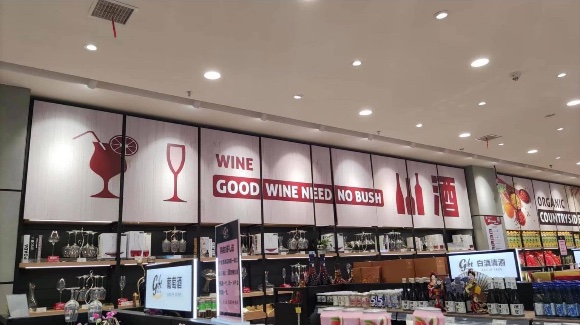"Good Wine Need No Bush"
« previous post | next post »
Received from Nathan Hopson:
Nathan wonders what could have resulted in this mangled translation. No other details are available, it was just shared with him via a friend of a friend. He asks whether there were some hanzi or phonetic overlap that could explain this Engrish store sign.
All I can add is that it is in a Japanese language environment. Otherwise, I'm stumped, but not yet bushed. With the help of Language Log readers, I'm sure we can solve the problem.
But wait! Except for the wrong form of the verb, this is not Engrish at all. It comes from Shakespeare:
First recorded in the epilogue to As you Like it by William Shakespeare: "If it be true, that good wine needs no bush, ’tis true, that a good play needes no Epilogue." Here, the term bush denotes a branch or bunch of ivy formerly hung as a vintner’s sign in front of a tavern.
(source)
In other words, it's a proverb that means something good does not need to be advertised, since one way or another people will inevitably discover its merits, which makes perfect sense in the setting where we find it here.
Selected readings
- "Let the Beer-Divider Be Chief!" (8/5/09)
- "Don't Drive in the What, er?" (8/4/09)
- "Ethanol tampons" (12/5/14)
- "English 'wine', French 'vin', Spanish 'vino'" (8/6/16)
- "Plum > apricot and wine > brew: the language of poetry and painting" (7/14/17)
- "Magical Penis Wine" (9/23/1)
- "Two brews" (2/6/10)
- "Ghosts and spirits" (2/24/16)
- "Kanji-esque alphabet writing on a sake label" (1/17/21)

Y said,
June 11, 2022 @ 12:05 pm
Like "No Point showing the '62 Volkswagen":
https://www.thebigad.com/2021/05/12/ad-with-no-photo-no-point-showing-the-62-volkswagen/
VVOV said,
June 11, 2022 @ 2:53 pm
Incredible find!!
Japanese store designer: I don’t want to be like those other guys, laughed at by foreigners for their mangled wasei-eigo slogans. I’ll use a quote from Shakespeare; what could be more genuinely English than that?
Modern English speakers: This is literally incomprehensible.
maidhc said,
June 11, 2022 @ 8:44 pm
It looks like the kind of store design used by Beverages & More–quotations like "Take a little wine for thy stomach's sake" up on the wall. Except BevMo tells you the source of the quotation.
Tore said,
June 12, 2022 @ 12:03 am
What's ment by "Japanese language environment"? I don't see anything Japanese in this picture.
AlexB said,
June 12, 2022 @ 2:31 am
The expression still is current, if a bit oldfashioned, in Dutch: goede wijn behoeft geen krans.
F said,
June 12, 2022 @ 4:34 am
VVOV: "Modern English speakers: This is literally incomprehensible"
I was familiar with it before I learned it had turned up in AYLI.
Victor Mair said,
June 12, 2022 @ 6:38 am
@Tore
Embiggen, then get out your magnifying glass and look again. But I could tell without even doing that.
TonyK said,
June 12, 2022 @ 7:35 am
@VictorMair: If I click to embiggen, the picture grows by about 15%. Even with a magnifying glass, that is not enough to resolve any of the characters except 酒 'jiǔ', which doesn't help to distinguish Chinese from Japanese. Perhaps you have access to a higher-resolution version? (Of course the ambience is pure Japanese, but I would be hard put to explain exactly why.)
Victor Mair said,
June 12, 2022 @ 7:54 am
@Tony K
"Perhaps you have access to a higher-resolution version?"
No, I do not.
Look yet again. Very closely and very carefully.
Victor Mair said,
June 12, 2022 @ 7:57 am
@F
Even with the grammatical error? I know many highly learned, highly intelligent people who were stymied in their understanding by that.
Terry K. said,
June 12, 2022 @ 1:33 pm
The pink sign has what looks to be Japanese writing on it. The rest (save for one product labeled with "5") seems to be Roman Alphabet letters or hanzi/kanji, or indecipherable.
Regarding "Good wine need no bush", I did recognize that changing "need" to "needs" makes it grammatical. I didn't recognize that doing so also makes it meaningful.
Elizabeth Ye said,
June 12, 2022 @ 7:17 pm
From 500 Common Chinese Proverbs and Colloquial Expressions by Liwei Jiao and Benjamin M. Stone, Routledge 2014:
# 301 酒香不怕巷子深 …implied meaning of this proverb would be 'a good product needs no advertisement.' Its functional translation is 'good wine needs no bush.'
Lukas Daniel Klausner said,
June 20, 2022 @ 1:53 am
Surprisingly, the meaning was immediately transparent to me, because in Austria, we have a vintner-based culinary establishment called “Buschenschank” which still advertises being open by hanging out a “bush” of vines.
Ethan Glasser-Camp said,
June 22, 2022 @ 8:19 am
How can you tell the writing on the pink sign is Japanese and not Chinese? Even using my computer's "zoom" function, I don't see anything that I can definitively categorize as kana.
My only guesses about what makes it a Japanese environment are:
1. I see a bunch of what look like sake, including the single-serving glasses of sake, on the shelf in the mid-foreground.
2. Those bottles are accompanied by what look like figurines. Are they perhaps figurines of geisha or something else culturally-specific?
3. Maybe there is some regional variation in how "jiu" is written that an expert could use to distinguish a Chinese environment from a Japanese one? I tried to follow up on this lead but didn't find anything online about it.
Terry K. said,
June 24, 2022 @ 1:06 pm
I'm the one who mentioned specifically the pink sign (responding to the conversation in the comments), and I didn't claim to see something that I can "definitively categorize as kana", only that it "looks to be" Japanese writing. Just a comment on what it seems to be, not a definitive conclusion. Even if the writing was clear, I would leave definitive statements to those who can read Japanese, which I don't.